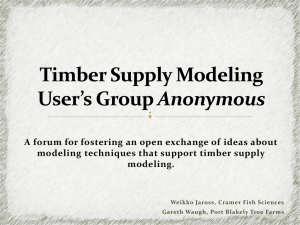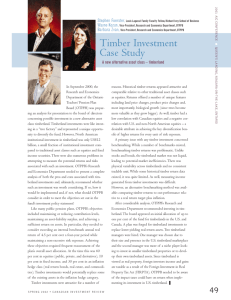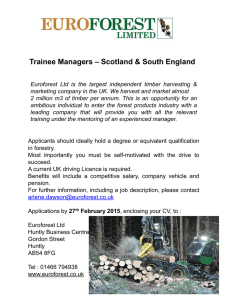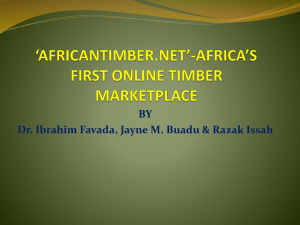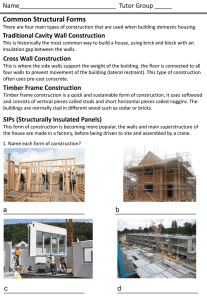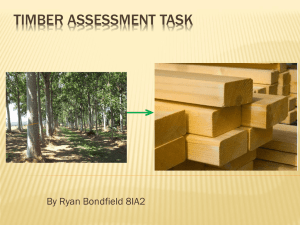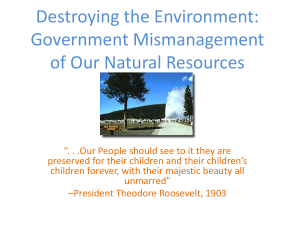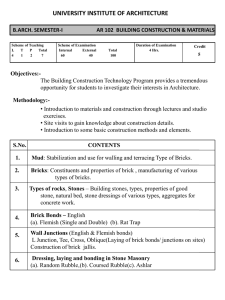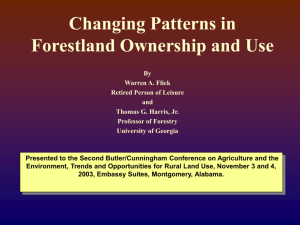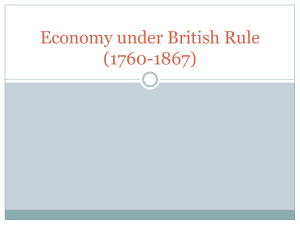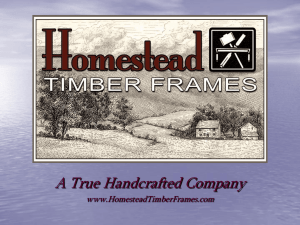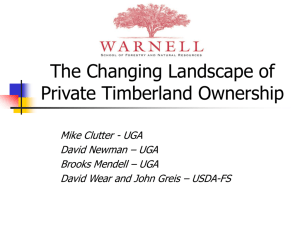View presentation
advertisement
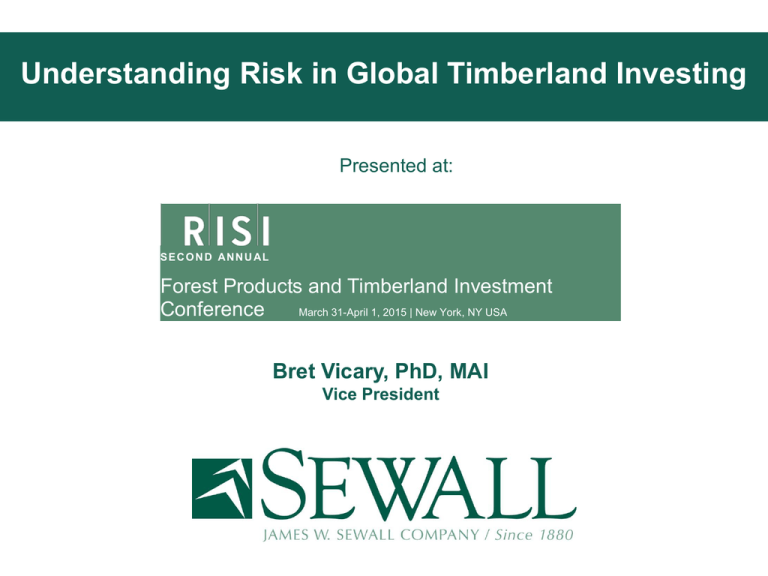
Understanding Risk in Global Timberland Investing Presented at: S E C O N D AN N U AL Forest Products and Timberland Investment Conference March 31-April 1, 2015 | New York, NY USA Bret Vicary, PhD, MAI Vice President US Timberlands – The Benchmark US funds major source globally Very diverse timber markets Extremely diverse forestland markets Low risk low required return Investors seeking higher risk-adjusted returns have sought offshore diversity. US Timberlands – Great Diversity Timber markets Pulpwood, CNS, sawtimber, veneer, poles, biomass Pine straw, maple products, tipping leases Great inter-regional diversity – species, planted vs. natural … Forestland markets – multiple uses Timber production Recreation – leases, sales Kingdom buyers – timber, recreation Wetland mitigation banking / Carbon HBU values- small tracts, aesthetics, second homes Conservation buyers – freehold, easements Mineral interests US Timberlands – Infrastructure Physical Roads – Rail – Ports Quality logging & trucking force Large Scale Cost effective, little or no management dilution Investment TIMOs – Timber REITS – Private equities – Pooled vs. Direct Legal, consulting, financial services US Timberlands – Legal / Security Legal Strong property rights Verifiable property title Transparent legal & court systems Political / Corruption risks low Stable currency Income tax – zero for domestic TIMOs Not so favorable for taxable entities Other “Mature” Timberland Markets Lack diversity – score fairly well otherwise: Tier 1 – Australia/NZ, Chile, Canada Australia/NZ – pine/euc, safe, spotty exports offer currency hedging. Tasmania diverse but much more risky. NZ – mostly radiata pine, safe, hedge currency w/exports Canada – diverse native forests, mills spotty, exports solid Tier 2 – Brazil, Uruguay Limited diversity (Euc, Pine, Teak plantations) Scale with world-class mills Instability poses challenges for foreign owners Native rainforest concessions are another matter “Emergent” Timberland Markets Diversity & scale can be challenging: Tier 1 – Panama, Eastern Europe Panama – entirely export-driven (teak), dollarized economy, friendly to foreigners, scale/road infrastructure challenges E Europe – diverse forests & markets, variable exposure to corruption but strides being made, attractive to W Europ. Funds (familiarity lowers perceived risks) Tier 2 – Central America Costa Rica, Nicaragua, Guatemala Teak driven Scale challenging Corruption & transparency issues Native timber not attractive “Frontier” Timberland Markets Africa, SE Asia, China, Native Tbr. Concessions – challenges: Market depth / Econ. Stability Infrastructure – Physical, Legal Scale / Mgt Dilution Mgt & Accounting Controls Corruption / Property rights Access to professional services Currency risk Liquidity on exit Sewall 2014 Investor Survey 19 “Active investor respondents TIMOs, Pensions, Endowments, REITs US base discount rate for US assets Down 25 bpts to 5.5% real, pre-tax, pre-TIMO fees Capital more available – est. USD 4-5 billion Sustained housing recovery – 1.5M starts by 2017 Cautious optimism Marked increase in 2014 global sales Carbon markets remain ephemeral Return to 1.5M housing starts in 2017? Sewall Investor Survey - 2013 World Bank Ease of Doing Business 3 4 10 11 16 17 19 24 34 41 NZ USA U.K. Australia China Lithuania Canada Latvia Chile S Africa Corruption Perceptions Index 1 19 14 9 80 43 9 53 22 72 New Zealand – radiata pine Exports add diversity, hedge currency Predictable yields and good scale … but basically a 1-species show Romania – native hardwood Progress with regulations, enforcement, business models … & a few opportunities for scale High-quality hardwood, species & market diversity Latin America – super trees Euc. in Brazil - how old? Teak in Panama … Verifying age & yield Tasmania – native hardwood Unstable gov’t leadership, intense social pressures… Non-investible climate by some accounts (Sewall Survey) Volatile market situation – Uncertain future for mills & resource base USA – Timber & Forestland Markets Maine timber & HBU Pacific NW young forest Vermont Sugarbush Georgia pine straw Due Diligence & Valuation Challenges Evaluating risk Inventory & GIS Timber yields | Markets | Legal-Political Losses from: Pests | Disease | Fire | Weather Potential for Scale | Exit options Who else will bid? Comparable transactions analysis – Market Value vs. Investment Value IFRS – Round peg in square hole CHAOS! Violates Principle of Consistent Use Ponzi schemes? Technology & precision may not enhance returns. Challenge creates opportunity. SEWALL – since 1880 BRET P. VICARY, PH.D., MAI Vice President, Forestry & Natural Resources +1.207.827.4456 | m +1.207.745.1926 bret@jws.com End Forestry Consulting offices: Old Town, ME Thetford, VT Charleston, SC International Falls, MN Biosketch Bret P. Vicary, Ph.D., MAI, LPF | Vice President Forestry & Natural Resource Consulting James W. Sewall Company – Old Town, ME | USA off +1 207.817.5447| mob +1 207.745.1926 | bret@jws.com | www.sewall.com Dr. Vicary provides forestland investors with valuation and due diligence services throughout the Continental U.S., Hawaii, Canada, Europe, Latin America, Africa, Australia, and New Zealand. Clients include timber investment management organizations (TIMOs), REITs, pension funds, forest industry, private equities, family investors, lenders, attorneys, public agencies, and conservation groups. An author and frequent speaker, Bret specializes in timberland investment analysis & appraisal, conservation easements and timber tax litigation. He holds the Appraisal Institute’s MAI designation, is a Faculty Associate at the University of Maine where he earned his PhD in Forest Economics, and is the principal author of the NCREIF Timberland Committee’s “Best Appraisal Practices.” Sewall’s Forestry & Natural Resource Consulting group, with offices in Maine, Vermont, South Carolina, & Minnesota, is the oldest in North America, dating back to 1880. It provides valuations and due diligence for some $20 billion in forest assets worldwide each year. Sewall forestry services: appraisal & investment analysis | investment counseling | forest inventory | growth & yield modeling | harvest scheduling | forest management | economic analysis | resource studies | training | litigation support | GIS & mapping | photogrammetry
